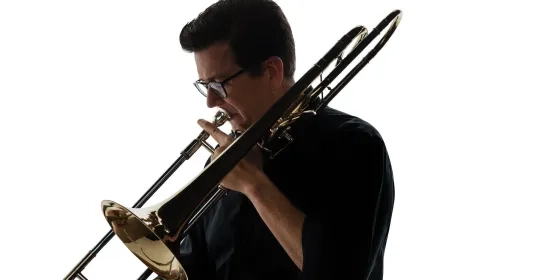The Music of Fatherhood: Tim Higgins Gets Personal in New Concerto
VIDEO: SFCM professor and San Francisco Symphony Principal Trombone Tim Higgins explains the inspiration behind his work, ‘Concerto for Trombone,’ which premiered with the SFS last year.
Trombonist. Teacher. Composer. Tim Higgins carries a lot of titles, and in 2020, he added "father" to that list, helping inspire him to create his work Concerto for Trombone, which premiered with the San Francisco Symphony last fall.
Turns out the SFS Principal Trombone and SFCM professor originally didn’t want to play the trombone, but the flute. This was after he saw a flutist perform John Williams' score from Star Wars in elementary school. But when Higgins went to join the band in middle school, the trombone was all that was left. The rest, as they say, is history.
A longtime teacher and member of the SFS since 2008, Higgins first began writing his own music a few years ago after feeling few composers wrote for the trombone and wanting to show its versatility. Then in 2020, Michael Tilson Thomas, then-music director of the SFS, asked him to write a concerto, an opportunity he called “thrilling.”
It was during the composition process that his feelings about becoming a father came out in his music. The SFCM Newsroom sat down with Higgins for more on his inspiration, his SFS premiere and his best advice for music students today.
Tell us about your introduction to music.
I began playing piano at the age of 10 and continued until I was in 9th grade. In sixth grade, I joined the band program at my junior high. When I went to the school to select an instrument to play, the only instrument left was the trombone. You could say I got stuck with it!
Tell us about Concerto for Trombone.
The Concerto for Trombone was written just before my son was born. Much of the work is based around my feelings about and expectations of parenthood. Overall, it is a playful, light-hearted piece. The second movement is based on a lullaby that I wrote for my son while he was in the womb. It depicts a night scene in which I struggle to help a crying child fall back to sleep. Eventually, the lullaby puts the baby to sleep as the sun rises.
What was it like debuting Concerto for Trombone with the San Francisco Symphony?
Equal parts thrilling and terrifying! To have a symphony like the SFS perform a composer's work is a dream. I liken it to driving a Ferrari: You never forget riding in a machine so exceptional in every way. On the other hand, as both soloist and composer, I'm accountable for every note onstage, even the ones that didn't come out of my bell! I felt enormous pressure for the piece to be successful. During the moments of rest from the solo playing, I was keenly aware that my composition was still being performed. I imagine most soloists enjoy even a few bars of rest during orchestral interludes. Performing a piece you wrote doesn't allow for that luxury!
What were the major musical influences in your life?
I owe a tremendous amount to my teachers along the way: Michael Mulcahy, Michael Warny, Randy Hawes and Gail Williams. Without their support and extraordinary wisdom, I wouldn't be where I am today. Outside of my immediate teachers, listening to the works of great composers has had an enormous influence on my musical voice. I greatly admire Stravinsky, Brahms, Britten, Copland, Shostakovich, and Nielsen, to name a few.
What are you currently listening to?
I'm listening to a lot of podcasts on the current events of the world. We play so much music each week that I rarely sit and listen to music!
How do you prepare for performances?
A light dinner and a slow warmup help me get centered.
What do you hope to pass on to your students?
A reverence for the tradition that is being handed down to them. We are guardians of a catalog of music that expresses an extraordinary range of human emotions. Musicians are fortunate enough to be the messenger for composers to connect with their audience. All of the music students in universities and conservatories should be mindful of this responsibility when they begin each day of practice.
What is your best advice for music students today?
Be a voracious consumer of the art form you are entering. Listen to as much live music as possible. Research as many pieces as you can. Know the canon as much as you can. And understand that all of our work on the fundamentals of our instrument only clarifies the message we want to tell the audience. Playing in tune, in time and with a good sound will only speak your musical message clearly to the audience. Once we master our instruments, we need to be sure we have something to say!
Learn more about studying trombone at SFCM.
